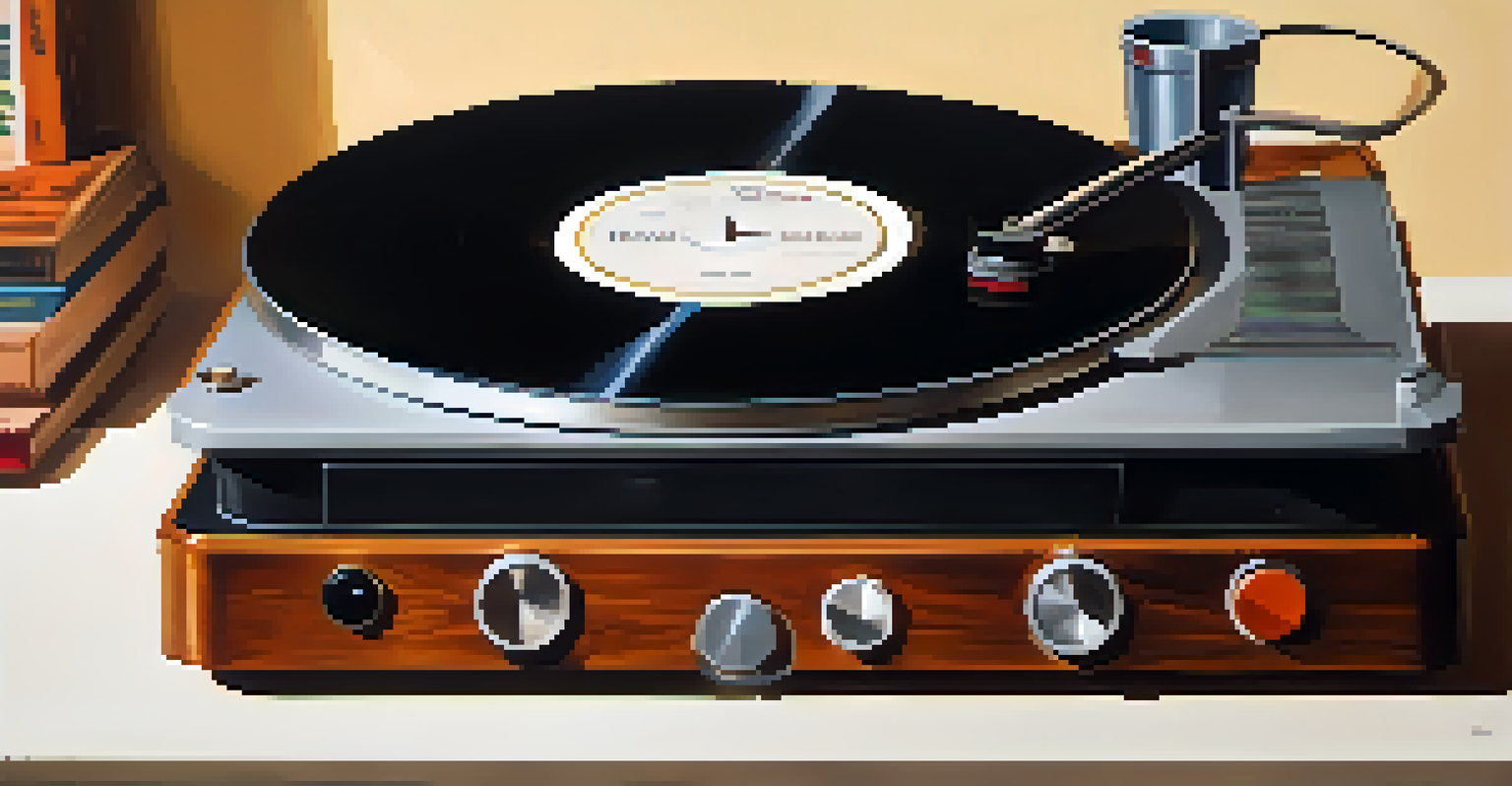Music and Memory: How Songs Evoke Personal Experiences

The Science Behind Music and Memory Connection
Music has a unique way of connecting with our emotions and memories. When we hear a song, our brains activate areas that are linked to memory, emotion, and even physical responses. This is why a simple melody can transport us back to a specific moment in time, reminding us of feelings and events we thought we had forgotten.
Music can change the world because it can change people.
Studies show that the brain processes music in a way that intertwines it with our personal experiences. For instance, when you hear a song from your high school days, it can evoke vivid recollections of friendships, milestones, or even heartbreaks. This phenomenon is often referred to as the ‘reminiscence bump,’ where memories from our teenage years are particularly strong.
Moreover, music's ability to evoke memories is not limited to joyful experiences. It can also bring back painful moments, making it a double-edged sword. Nevertheless, this emotional connection enhances our overall life experience, reminding us of who we are and where we’ve been.
Songs as Personal Soundtracks of Our Lives
Think of your favorite playlist. Each song likely represents a chapter in your life, acting as a soundtrack that narrates your experiences. Whether it’s a love song from your first relationship or an anthem from a road trip with friends, these tracks serve as reminders of those moments.

For many, music becomes a form of nostalgia. When we listen to certain songs, we often picture ourselves in specific places and times, almost as if we’re flipping through a photo album in our minds. This is why high school reunions often feature a carefully curated playlist that sparks shared memories among attendees.
Music Connects Emotions and Memories
Music has the unique ability to evoke strong memories and emotions, often transporting us back to specific moments in our lives.
Additionally, the personal significance of a song can deepen over time. A song that once represented a fleeting moment can evolve, taking on new meanings as we grow and change. This ongoing relationship with music enhances our understanding of ourselves and our past.
How Music Affects Our Emotions and Mood
Music is known for its powerful ability to influence our emotions. We often turn to uplifting tunes to boost our mood or soothing melodies when we need to relax. This emotional response is not just anecdotal; research shows that music can trigger the release of dopamine, the 'feel-good' hormone in our brains.
Where words fail, music speaks.
Certain genres are particularly effective at evoking specific feelings. For example, classical music may bring about a sense of calm, while a high-energy pop song might inspire motivation and happiness. This is why many people create playlists tailored to their moods, enhancing their emotional states through music.
Moreover, music can serve as a coping mechanism during tough times. It provides comfort and understanding, creating a sense of connection. When we listen to lyrics that resonate with our struggles, it can feel as if the artist is voicing our innermost feelings, making us feel less alone.
The Role of Music in Cultural and Shared Experiences
Music often serves as a cultural touchstone, bringing people together during shared experiences. Whether it’s a concert, a wedding, or a festival, these gatherings highlight how music can foster community and connection. We bond over our favorite songs and artists, creating collective memories that strengthen our relationships.
Consider national anthems or protest songs; they can evoke a strong sense of identity and purpose among individuals. These songs often become synonymous with movements, uniting people under a common cause and shared feelings. The emotional weight behind such music can forge lasting memories of solidarity.
Songs as Life's Personal Soundtracks
Our favorite songs act as soundtracks that narrate our life experiences, representing significant moments and emotions.
Additionally, many cultures have specific songs tied to rites of passage, celebrations, and traditions. These musical elements not only enrich the experience but also help preserve cultural heritage, ensuring that memories are passed down through generations.
Music's Therapeutic Benefits for Memory Recall
Music therapy has emerged as a powerful tool in helping individuals, especially those with memory impairments, recall personal memories. Patients with conditions like Alzheimer’s often respond positively to familiar tunes, which can trigger long-forgotten memories and emotions. This demonstrates music’s potential to unlock deep-seated recollections that might otherwise remain hidden.
Therapists use music to stimulate cognitive function and enhance well-being. By incorporating songs that resonate with patients, they can create a comforting environment that encourages communication and reminiscence. It’s a heartwarming reminder of how music acts as a bridge to our memories.
Moreover, this therapeutic approach shows that music's impact on memory isn't just about nostalgia; it can also be a vital part of healing. As individuals reconnect with their past through music, they often experience improved emotional states and a greater sense of identity.
The Impact of Lyrics on Memory and Meaning
Lyrics play a crucial role in how we connect with music and its associated memories. A powerful line can resonate deeply, making us reflect on our own experiences. When we hear words that echo our feelings or life events, it can create an even stronger bond between the music and our memories.
For instance, many people remember their first heartbreak through a particular song’s lyrics. The emotions captured in those words can perfectly encapsulate our own feelings, allowing us to process and remember those moments more vividly. It’s as if the artist becomes a voice for our experiences.
Music's Role in Collective Experiences
Music fosters community and connection during shared experiences, creating collective memories that strengthen our relationships.
Furthermore, the storytelling aspect of lyrics helps reinforce memories. Just like a good book or movie, a song with a compelling narrative can transport us back to specific times in our lives, helping us relive those emotions and moments as if they were happening all over again.
Creating New Memories Through Music Experiences
While music helps us recall past memories, it also plays a significant role in creating new experiences. Attending concerts or music festivals can lead to unforgettable moments that we cherish for a lifetime. The energy of live performances often amplifies emotions, making those experiences even more memorable.
In addition, sharing music with others can solidify bonds and create lasting memories. Whether it’s a spontaneous karaoke night or a road trip filled with sing-alongs, these shared moments weave music into the fabric of our lives, enriching our relationships.

Moreover, we can actively create new memories by exploring different genres and artists. By embracing diverse musical experiences, we open ourselves to new emotions and stories, expanding our personal soundtracks and enriching our lives with fresh memories.